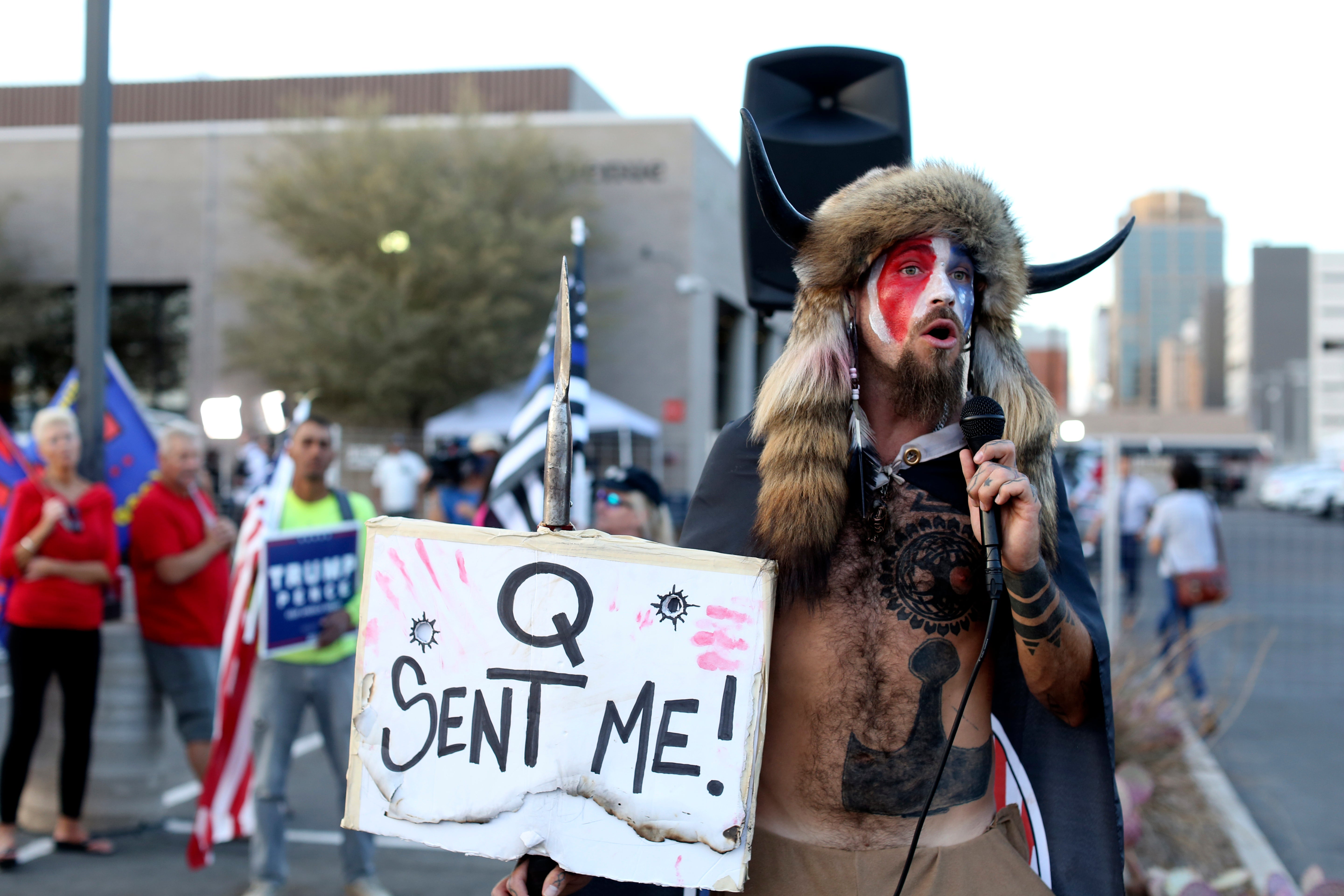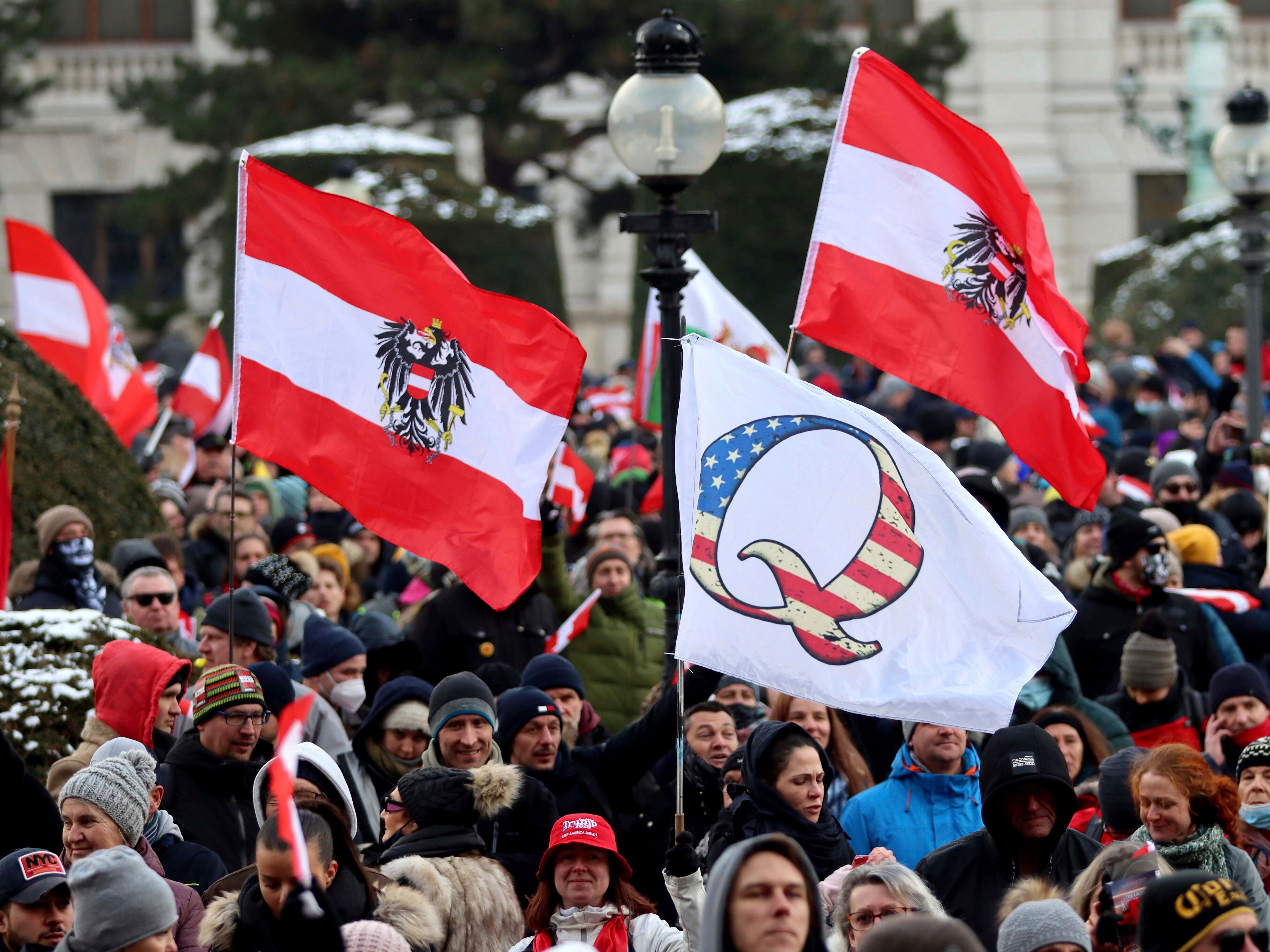QAnon: How the US Satanic paedophile cult conspiracy theory took root in Europe
Movement mutating away from original Trump-centric mythology to appeal to anti-establishment suspicion and anti-lockdown discontent in UK, France, Germany and beyond
QAnon is the online conspiracy theory cult that in the past has claimed a secret deep state cabal of devil-worshipping paedophiles is operating at the heart of the US government in Washington, DC, wielding the levers of power and drinking the blood of its enemies to stay forever young.
Originating on 4chan in October 2017, the movement believed, until recently, that Donald Trump was quietly doing battle with the Democrat leaders of this sinister elite - comprised of a constellation of conservative hate figures from Hillary Clinton to Bill Gates, Oprah Winfrey and Tom Hanks - and would ultimately win the day by overthrowing their tyranny and freeing the (imaginary) children they held captive for sex slavery.
However, many of its members were dismayed when the “Great Awakening” foretold by “Q”, the covert operative dropping updates online, entirely failed to materialise and the “storm” that erupted at the US Capitol on 6 January, in which the likes of self-styled “QAnon Shaman” Jake Angeli had participated, amounted to nothing, with Mr Trump’s election defeat upheld by Congress and Joe Biden duly inaugurated as his successor two weeks later.

The faithful’s latest fanciful revision of the Q narrative sees Mr Trump returning triumphantly to the presidency on 4 March after winning a nebulous legal battle to prove that all amendments to the US Constitution made post-1871 are actually invalid.
One of the most surprising aspects of the phenomenon is that, despite the US-centric nature of its ludicrous mythology (a more ambitious mutation of the earlier “Pizzagate” fable), it has spread around the world, dramatically so in 2020 as the coronavirus pandemic took hold and particularly in Europe, where millions of citizens have spent the past year confined at home in lockdown.
“If you feel like you’re losing control of your life, you’re more likely to believe in these conspiracy theories,” Jonathan Bright, a senior researcher at the Oxford Internet Institute, told Politico. “The coronavirus supercharged things. People are spending even more time online, so have more time to come across anti-vaccine and other conspiracy content.”
As the number of QAnon-related tweets rose from 5m in 2017 to 12m in 2020, according to NewsGuard data, sympathy groups sprang up in the UK, France, Germany, Italy, Austria, the Netherlands and Portugal, with street demonstrations staged in British cities last summer from London to Manchester in which many participants dropped the American “Q” motif and instead waved banners imploring society to “Save Our Children”.
“I’m not sure if I’m QAnon, I don’t follow that stuff much,” one young protester in London told the BBC last year. “But the deep state is not a secret, it’s not a conspiracy theory.”
“There are paedophiles in our elite everywhere and they need to be taken down,” said another. “This is happening in the US, in the UK and all over the world.”
At a rally in Konstanz, Germany, another demonstrator told a Euronews journalist: “I find there is huge control by the state. I stand here for all people, also for QAnon, because QAnon also says we are being divided more and more. I pray for every person who manages to get away from the mainstream, I also want more people to wake up!”
Their comments reveal precisely how the cult has been able to worm its roots across the Atlantic: by appealing to broad anti-establishment suspicions dating back to at least the 18th century, enticing the alienated and by binding with pre-existing local grievances about the state and with specific world leaders like French president Emmanuel Macron or German chancellor Angela Merkel.

“It’s sort of a meta-conspiracy and it encompasses a lot of different ideas, theories that are very easily translatable, Chine Labbe, NewsGuard’s managing editor for the EU, told Euronews.
“The idea that you have this deep state being led by world elites and working against the saviours, represented by a few white hats in the world with Donald Trump and others, it’s so easy to translate.
“For the French, it will involve Macron being described as a pawn of the deep state. For the Germans, it will be Merkel who’s a puppet of the deep state.”
Jakob Guhl, a researcher at the Institute for Strategic Dialogue who monitors extremist movements in Germany, agreed with this assessment: “Ever since the refugee crisis, in the conspiracy and far-right sphere, Merkel is the arch enemy. Trump is seen as the liberator from the Merkel regime.”
In France, the anti-government discontent expressed by the Yellow Vest movement since 2018, vaccination scepticism in the Covid-era and support for the likes of Dr Didier Raoult, who, like President Trump, advocated the use of the unproven anti-malaria drug hydroxychloroquine as a coronavirus treatment, have created an atmosphere of unrest in which Q could fester.
Marlene Schiappa, France’s minister for citizenship, said last month that the government “had its eye on” QAnon during an interview with France 3 in which she declared the development of “new conspiracist groups” was “very worrying”.
A new joint report from the French police and the state agency responsible for tackling sectarian movements on the threat posed by the movement is expected shortly.
In the UK, research by Hope Not Hate (HNH) revealed in October that one in four people believe in conspiracy theories propagated by QAnon, with 26 per cent agreeing that famous public figures were engaged in child sex trafficking and 17 per cent saying they believed the pandemic was a “depopulation plot” instigated by the United Nations or the “New World Order”.
“Activists in the UK have easily woven British issues - such as Operation Yewtree investigations into historical child sexual abuse - into Q narratives," HNH researcher David Lawrence told the BBC.
“Long before the birth of QAnon, prominent British conspiracy theorists have promoted ideas about elite, occult paedophile circles engaging in large-scale child trafficking and abuse and British activists are drawing on this broader tradition.”
The possibility that the movement’s beliefs could translate into vigilante violence remains a major concern, with HNH warning that there are “significant overlapping narratives” between Q and existing far-right themes, not least antisemitism, which the latter faction could exploit.
The Capitol riot in Washington last month was carried out by an alliance of right-wing militant groups, including the Proud Boys and the Oath Keepers, uniting with Q zealots in opposing the deselection of President Trump.
“Whilst it is impossible to know exactly how seriously QAnon followers take their beliefs, and when they will act on them, the highly emotive narratives at the core of QAnon have the potential to inspire individuals towards disruption, harassment and even violence,” Mr Lawrence and fellow HNH researcher Gregory Davis caution.

For Andrew Smith, a professor of French politics at the University of Chichester, Q does not constitute “an immediate political threat” because it has not aligned itself with any one specific party or cause.
“I see it as a symptom of a wider decay in political culture,” he told Vice. “The danger it represents is socio-cultural, undermining faith in the probity of the political institutions of parliamentary democracy, the scientific institutions which help research and improve our lives, and the nature of truth and honesty in ordinary discourse.”
But HNH warns that it could also create problems through its believers’ “Save Our Children” message, which could hinder investigations into real instances of child abuse by detering people from coming forward or sowing confusion by crowding out the truth with spurious claims, therein inadvertently faciltating the crimes it seeks to oppose.
Laura Duran, senior policy and research officer at Every Child Protected Against Trafficking, told the BBC its rhetoric is “a slap in the face of survivors who have gone through exploitation”.
Other worrying aspects of the movement are its apparent success in making an emotional appeal to parents, particularly those online disturbed by its apocalyptic warnings of prevalent paedophilia.
Researcher Marc-Andre Argentino has called this phenomenon “Pastel QAnon” and says it reaches out through “lifestyle influencers, mommy pages, fitness pages, diet pages, and alternative healing” on Instagram.
While the immediate future of Q, in the US and overseas, remains to be seen, one of the most surprisingly compassionate responses to it remains that of James Alefantis, owner of the Washington restaurant Comet Ping Pong that was baselessly targeted by Pizzagate trolls.
Speaking to Private Eye editor Ian Hislop for the magazine’s Page 94 podcast, Mr Alefantis said: “People want to make sense of the world maybe and they feel disempowered or disenfranchised from their lives.
“A lot of people in America don’t feel like they have power or control over their lives so a crazy conspiracy theory that makes you believe or hate or feel something or you feel that the government is oppressing you and you can’t find a job or you can’t make work for yourself - those are difficult situations to be in and sometimes I think it becomes confused and people try to log onto something they feel like they can control or they can take an action about.”
Join our commenting forum
Join thought-provoking conversations, follow other Independent readers and see their replies
Comments

Bookmark popover
Removed from bookmarks